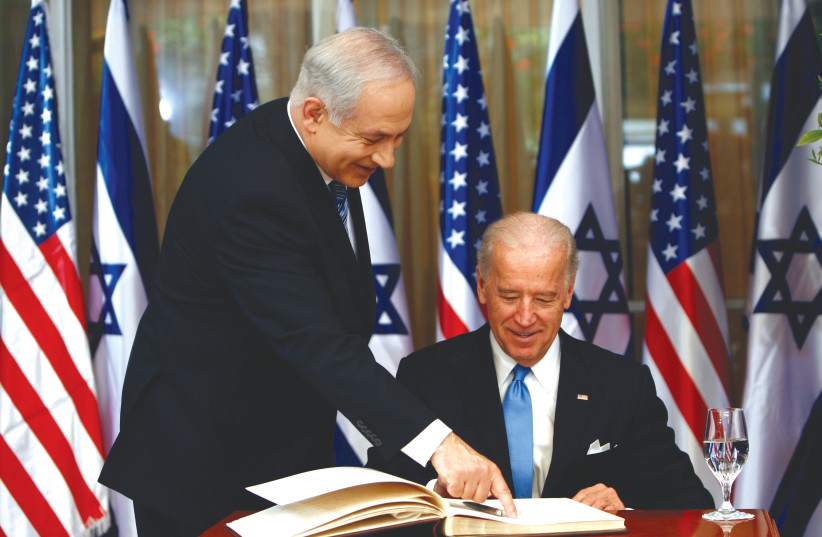
This article is more than
3 year old
Prime Minister Benjamin Netanyahu made history the moment he was sworn in and held his first government meeting after an 18-month hiatus.
He has won more prime ministerial elections in the country’s history, formed more governments and served more time in office than any other prime minister.
One could almost joke that his time off was a well-earned sabbatical.
Netanyahu noted his history as he opened his first cabinet meeting on Thursday, stating that “this is the sixth time I have formed a government in Israel, and I am now beginning my 16th year as the prime minister of Israel.”
He joked that he should have gotten used to this, but explained that the enormity of the responsibility and the sanctity of the moment is never lost on him.

“Now the celebration is over. It’s time to roll up our sleeves and get to work,” Netanyahu said, wasting no time in setting out his top agenda – halting Iran’s pursuit of building a nuclear bomb and preventing its regional aggressions.
“This is an existential issue,” he explained. That Iran was top on his mind, something he has already mentioned multiple times, comes as no surprise.
Netanyahu has been one of Iran’s most long-standing and well-known diplomatic foes. There is no one more identified than he is with the campaign against the Islamic Republic. And there has never been a more opportune moment for him to return.
The United States’ long-time adherence to delaying Iran’s nuclear program through a diplomatic agreement, known as the Joint Comprehensive Plan of Action, created deep friction between Jerusalem and Washington.
The Biden administration, which has unsuccessfully sought to revive the deal, is now exploring other options.
This has created an opening for Israel and the US to work closely together on the issue. Netanyahu has also put together a slate of political appointments who can converse well with Washington, including Yoav Gallant as defense minister, Eli Cohen as foreign minister and Ron Dermer as strategic affairs minister.
Then there is Netanyahu and US President Joe Biden themselves, who have been friends for decades.
Biden immediately issued a congratulatory note on Thursday, speaking of the friendship and saying he looked forward to working with him “on the many challenges and opportunities facing Israel and the Middle East region, including threats from Iran.”

Then there is his goal to expand the Abraham Accords, under which he normalized ties with Israel and four Arab nations in 2020 and 2021. Given this track record, it is reasonable to assume that he has the potential to do so. He himself has spoken of Saudi Arabia as one of the next Arab nations to make a deal with Israel.
Even outgoing prime minister Yair Lapid and President Isaac Herzog have spoken of that possibility.
The fact that Netanyahu is already so well-known and has put together a stable diplomatic team has made him well-poised to lead Israel on security and regional matters.
This is true with Moscow, as well, given that he has good ties with Russian President Vladimir Putin, with whom he has already spoken this month.
But the formation of his government and the events around his swearing in differed from such ceremonies he held in the past. While he might be a stable diplomatic face, his return to power has created domestic chaos.
Thousands have already demonstrated against his government, which is the most ultra-right-wing one in the country’s history.

Politicians at home and abroad have warned that this government will harm democracy by making the courts subservient to the legislature, and that it will harm religious pluralism by strengthening the power of the Orthodox Chief Rabbinate over religious and secular life.
That follows worries about the standing of minorities such as the LGBTQ community and Israeli-Arabs, and women.
Then there is the chaos likely to follow by the appointment of double ministers to government offices, thereby making the allocation of power unclear.
Nowhere will this likely be more felt than in the West Bank, where violence is already high and predictions are that it will only continue to rise.
Finance Minister Bezalel Smotrich, who is also going to be a minister in the Defense Ministry, will have the power to make decisions that could spark additional violence. The same is true for National Security Minister Itamar Ben-Gvir, who will oversee the Border Police.
Jordan’s King Abdullah II has already warned of a third intifada.
Netanyahu’s challenge will be to maximize the benefits of experience against domestic chaos.
His decision to appoint the first openly gay Knesset speaker, Amir Ohana, and then to sit with him and his partner and their children, presented an optimistic picture of how the fears that Israel may be losing its democracy might be overblown.
Anyone listening to the Knesset debate, however, would have heard coalition lawmakers threatening to pass legislation banning Israeli-Arab parliamentarians from the Knesset.
Then there is the coalition pledge to put in place policies that would set the groundwork to annex portions of the West Bank.
In his statement to Netanyahu, Biden also warned that his administration would oppose any moves that threaten a two-state resolution to the conflict. It was a sharp message for a congratulatory note and predictive of the trouble Netanyahu will have with Western allies.
Reporters asked Netanyahu about this statement, but found him only willing to talk about how successful these next few years will be.
And they could only heighten his already unbelievable diplomatic track record, but the foundation of this government is just as likely to lead him to defeat.
When Netanyahu left office in 2021, he left a note promising to return.
This time around, Lapid left him the same note, effectively predicting that Netanyahu’s tenure will be short-lived and that Lapid will be back in office next year.